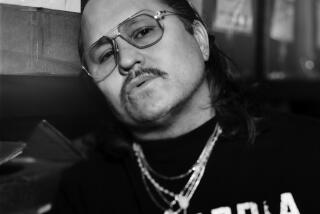Exhibit Focuses on Chavez Legacy
- Share via
When Christine Chavez-Espinoza was 5, she stood on the front lines with her grandfather Cesar E. Chavez, picketing, passing out fliers and rallying for the rights of campesinos--the farm workers. That year the pair got arrested in Detroit during a strike and were jailed.
Such was family life with the late labor activist whose legacy is viewed through the lenses of six photographers at the Anaheim Museum’s latest exhibition, “An American Leader, Cesar E. Chavez.”
Chavez-Espinoza, 28, will make a guest appearance at the museum on Thursday, rekindling memories of her grandfather’s joys and struggles during a reception with photographers and the exhibition’s curator attending.
“I think my grandfather would be taken aback by all the attention he has gotten from the public parks and streets named after him, to the holiday, and this exhibition dedicated in his honor,” said Chavez-Espinoza, the fourth of 30 grandchildren.
The show, in Spanish and English, saluting Chavez as an American hero is a move by the Anaheim Museum to reach out to its largely Latino community, museum executive director Joyce Franklin said.
“Most museums our size see themselves simply as storehouses. But we see the museum as an active participant in the community,” Franklin said. “We want to have more shows that address the ethnic representation of our community.”
The Latino population has grown substantially since 1990, according to the U.S. Census Bureau. The agency says Hispanics number about 801,800--29% of the Orange County population.
In Los Angeles the exhibition brought in a new audience of Latinos who typically do not visit museums, said Denise Lugo, curator of the original show at the Latino Museum of History, Art and Culture.
“We’re excited the Anaheim Museum wants to pick up the exhibition in Orange County,” Lugo said. “This is not just a show for Latinos but for all Americans.”
Ninety black-and-white images spanning about 30 years document the birth of the United Farm Workers starting with the grape strike/boycott in the mid-’60s and continuing with Chavez’s role in the civil rights movement.
Through the years the UFW, founded by Chavez and Dolores Huerta, fought against the use of pesticides on grape farms and exposed poor working and living conditions of laborers.
The photographs chronologically capture Chavez from his early years as a charismatic young leader to a time just days before his death.
Guest curator Kent Kirkton selected the photographs.
“I’ve always wanted to put together a visual history of the union,” said Kirkton, who is director of the Center for Photojournalism and Visual History at Cal State Northridge. “So we selected photographers who worked closely with Chavez and the UFW.”
Some of the earliest photographs were taken in the tumultuous ‘60s by John Kouns and Emmon Clarke. The ‘70s, a time when labor unions gained steady ground, were mostly covered by George Rodriquez and Oscar Castillo. The latter part of Chavez’s life is photographed by Victor Aleman and Jocelyn Sherman, who still works for the UFW.
In one image, cigarette smoke encircles Robert F. Kennedy, who is entrenched in heated debates during a Senate subcommittee meeting on the arrest of dozens of picketing farm workers in Delano, Calif. In another, Kennedy is sitting beside Chavez, handing him bits to eat after a 1968 fast.
The show also has a replica of a migrant worker’s wooden cabin. The images are as much about the present as the past, said Chavez-Espinoza, a Los Angeles resident who continues her grandfather’s work at UFW.
“The leaders of unions such as the hotel restaurant employees union, the janitors union and the MTA union workers who were just on strike, and other working people have either worked with him or were inspired by his message.”
*
“An American Leader, Cesar E. Chavez,” Anaheim Museum, 241 S. Anaheim Blvd., Anaheim. Wednesday through Friday, 10 a.m.-4 p.m.; Saturday, noon-4 p.m.; Sunday-Tuesday and holidays by appointment only. Special reception: Thursday, 5-7 p.m. Through April 7. (714) 778-3301.
More to Read
Sign up for Essential California
The most important California stories and recommendations in your inbox every morning.
You may occasionally receive promotional content from the Los Angeles Times.













